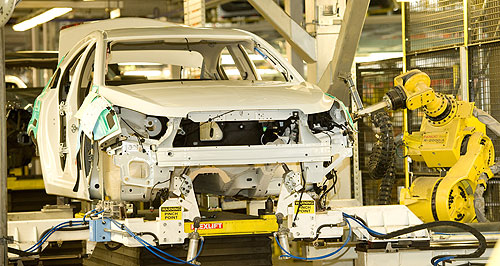Make / Model Search
News - General News - PartsParts-makers warn of premature collapseOn the line: Australia's parts-makers are predicting the automotive industry could fold before 2017. Just one parts-maker’s demise could stop car industry dead, warns FAPM20 Feb 2014 By IAN PORTER PARTS-MAKERS have warned the Productivity Commission that Australia’s ailing car industry could be brought to a sudden and premature end before its scheduled demise in 2017 by the failure of a single component manufacturer. The Federation of Automotive Products Manufacturers (FAPM) also warned that many parts-makers might not be able to meet their obligations as the industry grinds to a halt. The warnings came on Wednesday as the Productivity Commission announced it was changing tack and focusing on assistance for the parts supply chain in its motor industry hearings. Commission deputy chairman and presiding commissioner for this inquiry, Mike Woods, told Wednesday’s sparsely attended hearing: “With the changed circumstances following Toyota’s announcement and that of GM Holden, this inquiry will be focusing its final report quite heavily on the issues facing the component manufacturers and also the workforces of both the assemblers and the component manufacturers. “And, as a follow-up to that, some of the regions particularly affected by that. That will naturally lead to a reorientation of our final report to focus on those issues,” he said. The need for emergency government assistance was highlighted by an FAPM estimate that it could cost a parts-maker with 700 employees about $35 million just to meet its obligations and close its doors. FAPM national president Jim Griffin said the government needed to move quickly if it was to avoid a disorderly wind-down of the industry. “The biggest risk is that the industry stops before 2016, in Ford’s case, and 2017 in Holden and Toyota’s case,” he told the commission. Mr Griffin said there was an urgent need to draw up a profile of the parts industry so the FAPM and the government could see which were strong companies and which were weak. “We need to identify those firms which present a failure risk and which could bring the whole industry down quickly,” he said. Profiling would also identify those suppliers that are going to close and exit Australia with the car-makers they supply and also those which have a chance of diversifying and surviving. Mr Griffin said that before profiling could begin, the government needed to take action so that companies would not be sued for anti-competitive behaviour by the Australian Competition and Consumer Commission. “One of the first things we have to address is clearing a way through the ACCC so that everybody is comfortable and able to do that (profiling) work,” Mr Griffin said. The FAPM’s southern region president, Glenn Paine, stressed the need for urgent action. “There has been a suggestion that there is no urgency because the auto industry is not closing until 2016 or 2017,” he said. “In the supply base, which provides the vast majority of the people affected, and probably the least covered in terms of their entitlements, these things are happening right now. There are people affected right now.” Workers’ entitlements are a major issue for many companies, which have been losing money in recent years as production volumes have fallen. This is why the FAPM and the government are looking at encouraging consolidation among parts suppliers. FAPM vice-president and chief executive of Futuris Automotive, Mark de Wit, gave the commission an idea of the costs involved in closing down with an example that sounded a lot like Futuris Automotive’s reality. “Let’s call this example Fictitious Automotive,” he said. “This company has three sites around Australia supplying to the three OEMs, and it has 700 employees. “Each employee has about a $40,000 entitlement between annual leave, long service leave and redundancy costs. “That times 700 is $28 million, plus the closure of three sites … is about another $7 million. So there is a $35 million bill coming to Fictitious Automotive over the next three years in a circumstance where the cash flows, because of diminishing volumes, is also diminishing at a rate of knots.” Mr de Wit asked the commission to recommend that any payments due to parts-makers under the Automotive Transformation Scheme be accelerated. At present, payment is spread over 33 months. “The past three years of funds receivable that is sitting there, owed to Fictitious Automotive, could be paid in a lump sum rather than blending it out between now and 2017.”  Read more5th of February 2014  Parts industry savages Productivity CommissionIndustry policy vacuum holding back Australia’s auto parts industry, says AAAA3rd of February 2014  Toyota silent on potential car-killing position paperToyota says it will wait for March’s final PC report on car industry |
Click to shareGeneral News articlesResearch General News Motor industry news |











Facebook Twitter Instagram